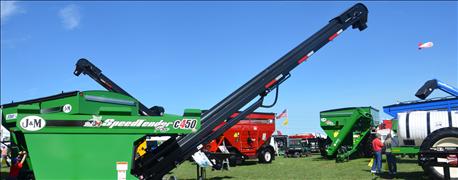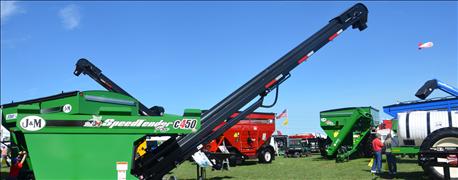
If you purchase a tractor, a grain cart or even a seed tender before Dec. 31, can you automatically depreciate it in 2016? Or are there other requirements that you must meet? That’s the question addressed by Profit Planner panelists this month. The question comes from a farm couple in west-central Indiana who avoided a big sang a year ago because they listened to their accountant, not the machinery dealer.
Panelists include David Erickson, farmer, Altona, Ill.; Mark Evans, Purdue University Extension director, Putnam County, Ind.; Steve Myers, farm manager, Busey Ag Resources, Leroy, Ill., and Chris Parker, farm management specialist, Morgan County, Ind.

KNOW BEFORE YOU BUY: If you’re hoping to get a tax break on equipment bought before the end of the year, be sure you know the IRS rules that apply.
Question: My machinery dealer and I are negotiating on two tractors and a combine. The manufacturer is offering big incentives to switch brands. We may push the end-of-the-year deadline to work out the deal. My accountant says I would need the new equipment in my possession on Dec. 31 or I can’t count it for depreciation. My dealer says all I have to do is sign the sales agreement. Who is right? Are there other considerations in the possible equipment swap related to taxes I should know about?
Erickson: I would listen to your accountant on matters involving business expensing, depreciation and tax implications of equipment purchases. Your accountant should have a strong understanding of agriculture and the farming business, or look to engage an accountant with more specific understanding of your business. I hope you’re not considering the trade deal based only on cost. You should also consider dealer support and performance of your current line of equipment.
Evans: Your accountant is who you should place the most trust in with this discrepancy. Since this is important to you, it would be wise to seek a second opinion. Perhaps you could consult a university Extension economist who specializes in farm taxes for that second opinion or validation. While honesty is the best policy, it also seems unfathomable that the location of the equipment would matter — rather that both the agreement and payment be made. The timing of the payment would seem to be the greatest consideration.
Myers: Perhaps both are right. But your accountant is giving you advice that you pay him for with no vested interest in the sale. Communicate the concerns to both and ask if you have serial numbers for the items and they are "placed in service" or available for your use. Don’t forget you may still have your "old" equipment on your books to utilize for depreciation if you can’t get the new items placed in service.
Parker: According to Michael Langemeier, tax specialist with the Purdue University Center for Commercial Agriculture, the equipment must be in your possession and ready to use by the end of the year for full depreciation. Your accountant is correct. Follow his or her lead for other possible considerations related to taxes.
Summing up: Indiana Prairie Farmer sought advice from an independent accountant with farm clients. He agrees that Langemeier is correct. In case rules change, always consult your tax consultant first.
.jpg?width=400&auto=webp&quality=80&disable=upscale)
About the Author(s)
You May Also Like




